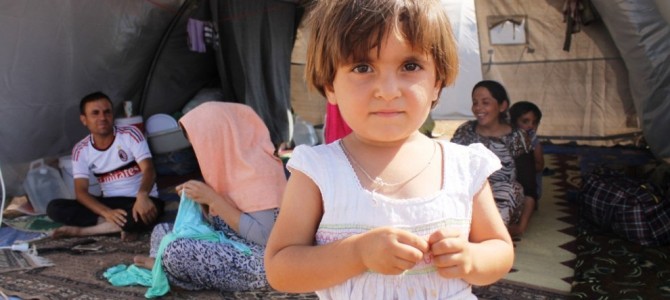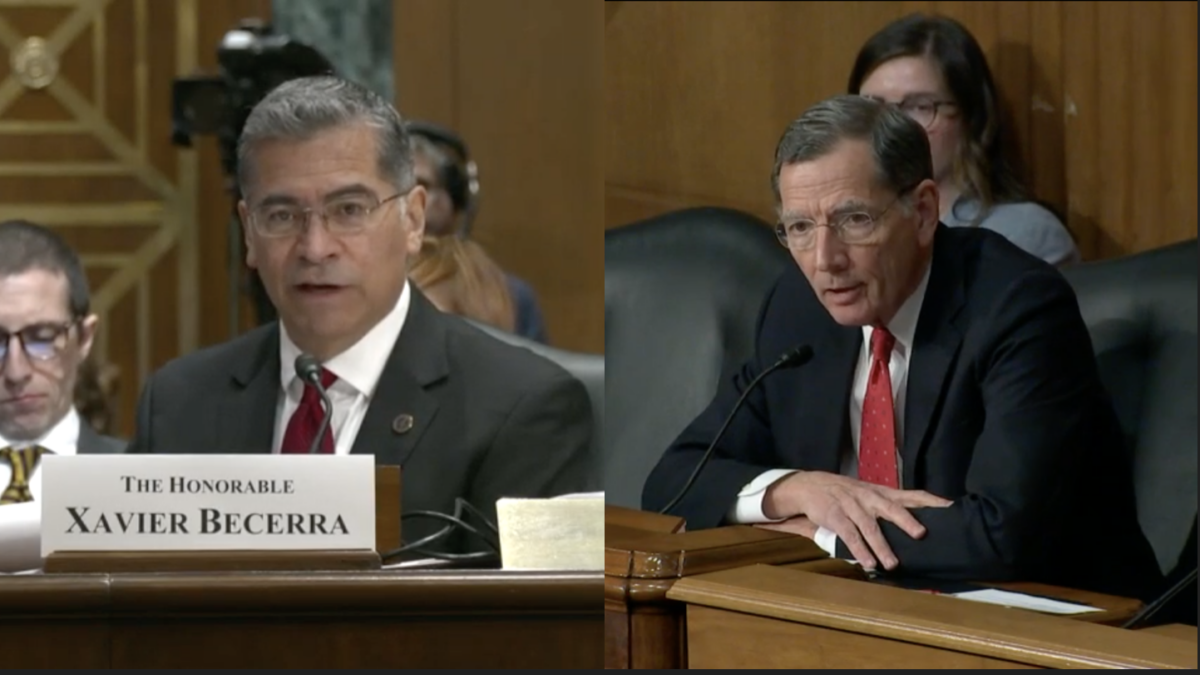
How many arguing over the refugee debate have risked their lives for both Americans and Muslims from any of the seven countries on President Trump’s executive order? I have, and my strong feelings for both sides is causing no lack of frustration over how partisans are framing the debate.
When my military aspirations were shattered by injury, I signed my last will and testament at the age of 25 and boarded a flight to Baghdad as a civilian. My company supported the Army’s Combat Support Hospital (CSH) that was featured in HBO’s “Baghdad ER.”
In 2009, the United States transferred the Ibn Sina Hospital back to the Iraqi government and relocated CSH operations from the International Zone (IZ) to a facility in the Victory Base Complex (VBC). VBC didn’t have the IZ’s Iraq-first culture of hiring local laborers, and I didn’t have on-base banking options to pay our Iraqis in cash.
However, we knew what losing their jobs would mean for the Iraqis and their families. So I had to personally risk “getting disappeared” once a month running nearly half a million in cash through Iraqi-controlled territory. My corporate office prohibited weapon carry and refused to provide armored vehicles or private security. It was too much of a liability (no kidding!), and we were threatened with being fired for doing what had to be done. Inshallah, we believed we could pull it off, and I accepted greatly increased personal risk to my life solely for help good people who devoutly profess the shahada.
Call me an Islamophobe if you want to debase your own intelligence. If you want to argue that I didn’t do this for patriotism but for money as an evil contractor, I will gladly hire you for the same $80,000 salary I naively agreed to, so long as you can make it the same 19 months in Baghdad. Holster the partisan shame tactics on both sides, and let us turn to reason.
Both Sides Are Good And Necessary
The argument over refugee policy is framed as Side A: protect Americans; Side B: protect refugees. My side good, your side bad. A > B or B > A. Arguing which is greater is unnecessary, as they don’t have to be mutually exclusive. If A + B = C, then C > A or B individually, as the moral sum is greater than its parts.
This additive moral approach only holds up if both sides are morally good, necessary, and not mutually exclusive. First, it is a moral good to protect your fellow Americans. This is necessary, as one can’t finish the one-sentence Preamble to our Constitution without knowing it is our government’s duty to “provide for the common defence.”
The common-sense argument I have heard most regarding this is, “Do you lock your doors at night?” The most salient counter is, “Yes, but do you not answer the door when someone is screaming for help?” Should you answer when the local news has been reporting that gangs have been posing as people in distress as a tactic to then rape, murder, or rob your family? I’m personally less averse to risk than most people, as I’m a well-armed 6’6” weightlifter who only has to protect a labradoodle. I don’t blame those more averse to risk.
Regardless of your personal approach to home security, foreign policy hawks have to realize that national security policies affect people’s lives. Actions have consequences, and we’re responsible for them. No political party is innocent here. Syria is a total mess, with Obama’s fingerprints all over it.
And no, refugees don’t have any rights under the U.S. Constitution. Yet we can’t abandon the argument for our national independence that was predicated upon the belief that God created us all equally and with unalienable rights. “America first” and #MAGA all day long, but the Keep America Great 2020 campaign will ring hollow if we abandon such great American ideals.
It is good to help refugees, and it is necessary in the eyes of both the refugees and of our national moral character. The core question is whether the two sides are required to be mutually exclusive. Is U.S. resettlement the only way to satisfy this moral imperative?
There’s a Better, Third Option
There’s a third option: Regional resettlement. Regional resettlement is far more practical and gets the job done for less cost and stress upon the refugee, irrespective of the argument on whether to allow resettlement here.
If you’re working up a rage over “irrational fears” with this notion, buy a plane ticket to Baghdad and then lecture us all on fear. By the way, you can’t exactly book a flight a flight through Expedia. How many politicians arguing over this would put on a town hall tour in all seven of these countries without a security detail? That would be recklessly irresponsible of them, so why should the reverse scenario be safe?
Question the requirement to resettle here. I have Iraqi brothers and sisters, our kinship born of mutual respect and challenges we overcame together, and I want the best for them. My former right-hand man is doing well and is getting a science degree, but I have listened to the unhappiness of people whose ability to find happiness in their war-torn home was inspiring. I wanted them out of harm’s way and personally helped some in the paperwork process, but I can’t in good conscience say America is the only way for them to flee war and be happy.
Compassion Means Respecting People’s Comfort Level
Cultural isolation is real, and it’s hard for Americans, with our rather non-Westphalian melting pot heritage, to understand this. If you believe that cultural isolation is a good thing and conducive to enjoying your life, take yourself through the reverse. Celebrities didn’t even make good on their threats to move to Canada if Trump won. How would they fare in Mogadishu?
Isolation is a contributing factor to what terrorism scholar Marc Sageman calls “radicalization in the diaspora.” It helped lead privileged, non-devout Muslims studying in Germany to radicalize and take part in the 9/11 attacks. This radicalization happened in Europe, which has far more experience integrating Islam into Western society.
Logistically and culturally, regional versus U.S. resettlement makes sense. If you’re in Aleppo and need to bug out, you’re 40 miles from the Turkish border. If you’re going to fly to the United States, you’re probably going to have to go through Turkey anyway. Why not work with our allies to assist refugees closer to their home? The cost of living is far lower, and it would expend less taxpayer dollars than the automatic welfare programs they receive upon acceptance here.
To those opposed to this idea, what is your motivation? Are you acting out of compassion and a sense of responsibility for our international actions, or are you blindly devoted to a failed and asinine grand political strategy of dividing Americans demographically? It is arguably cultural imperialism to necessitate that life in America is refugees’ only path to happiness, and that it is impossible to rebuild a life in a place that feels far more like home. Regional alternatives are better for the individual from a cultural, religious, and linguistic perspective.
What’s best for the refugees should be the question at hand. Refugees are asking for help, and help them we should. We can acknowledge and respect our cultural differences and consider that regional alternatives are a good solution.
Jihad Is Serious, and Vetting Only Helps So Much
Militant Islamic jihad is a threat we must never forget. Sagemen’s latest work coins the term global neojihad, as he argues that legitimate jihad is “declared by a legitimate government, not by individuals.” Congress declares war, not a single congressman. Thus terrorism is a corruption of an otherwise valid tenet of a religious concept, just as, by logical extension, our “neowars” are eroding our constitutional notion of war and checks and balances.
These radicals have declared illegitimate war on the world, and their earliest victims were their fellow Muslims. They are a scourge upon Islam arguably more than upon the rest of the world. This cancerous idea is only eliminated through reform within Islam and its teachings.
That said, there are nation-states standing in the way of peace. State sponsors of terror are bad actors that are making matters worse. Congressional action would guard us against the politics of one administration to the next (Obama’s list of state sponsors of terrorism is laughable). Define what reforms we want to see in these countries, and pressure them to comply. Banning admission to U.S. soil is entirely constitutional, yet it is but a small part of the larger playbook to apply pressure to these malignant governments.
Extreme vetting is a naive assumption. Aside from the easily forgeable ID cards and lack of information infrastructure, this ought to include the kind of personal interviews we conduct in security clearance background checks (they aren’t lightly vetted).
Are you going to knock on a neighbor’s door in Aleppo and ask if he’s a good guy? Even if you naively accept that you were told the truth and didn’t lose anything in dialectical nuance, word could reach the wrong people. Jihadists don’t joke around. They drill holes in your brain and ransom your dead body to your family, just like they did to one of my company’s vendors when his access badge was discovered in his shoe. To not interview increases risk for us. To interview increases risk to them.
The one exception is for those who risked their lives to help us. If you assisted the CIA or were an Army interpreter, for example, you deserve a hero’s welcome.
We Can Come Together to Do the Right Thing
2016 was a tough year for most to endure, but reasonable people must understand our new president is a pragmatist, not a partisan, and we should want every president to do good by our country.
Only a fraction of Muslim-majority countries were on Trump’s restricted entrance list, and the door remained open to 87.8 percent of the Muslim umma, yet the media and the Left would have you believe otherwise. Our country already knows more fiction than fact about Islam and Muslim culture, and both parties and our insufferable Fourth Estate are making matters worse.
This should be an easy sell to President Trump. Channel our great national idea that all are children of God by showing much-needed goodwill towards Islam. This can be done in a way that can strengthen critical Muslim alliances, demonstrate repentance from the wars of his predecessors, and cut spending without compromising American safety.
Both sides are good and necessary, and both can be satisfied to accomplish a greater moral good, while honoring our foundational principles and the legacy of the 9/11 generation.









